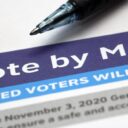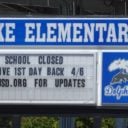When it comes to voter trust, Republicans are far and away the leaders on handling government spending, while Democrats lead by a similar margin on environmental issues. A new Rasmussen Reports national telephone survey found that 49% of Likely Voters trust Republicans more than Democrats on the issue of government spending. Far less, 33%, reported that they trust the Democrats more. This 16-point gap is the widest between the two parties since Rasmussen Reports started regularly tracking this issue in January.
But how much does this actually matter, or even more important, do Americans believe big government is reversible. A prior survey on April 14, however, found that only 19% of Likely U.S. Voters thought that the era of big government was over. The survey found that 53% did not believe that to be the case, and 28% were not sure.
This really speaks to relevance. As voters go to the polls, as we saw in 2012, although issues might be paramount it is relevance or believability in change that actually holds water. Scott Rasmussen put this well when he said:
President Bill Clinton in a 1996 address famously declared, “The era of big government is over,” but President Obama’s agenda has led many to conclude that era is back. Most voters wish Clinton was right; few think he is.
How much can the support for Democrats on the issue of the environment be translated into success at the ballot box? As with any specific issue, it is the comprehensive message that matters come election day, as Americans are typically inconsistent and a bit incoherent on issues – and of course I mean this in the least offensive manner.
In other words, consider this: The environment is consistently a top concern and priority for the American people. Who would want “dirty air and dirty water” (except the GOP according to Obama)? Yet, a full 49% are unwilling to sacrifice the economy for global warming, or other eco-liberal agenda matters:
Most voters still consider global warming a serious problem, but less than half are willing to pay any more in taxes or higher utility bills to do something about it.
This is the case despite the fact that 63% of Likely U.S. Voters consider global warming to be at least a “somewhat” serious problem, while just 34% regard it as “not serious.” These figures include 37% who view global warming as a “Very Serious” problem and 14% who describe it as “Not At All Serious.”
Just as Americans overwhelmingly favor cutting spending, oppose big government, and so on, they are less than willing to do the hard cutting that may or may not affect them personally. Besides, 81% of Likely U.S. Voters rate the quality of drinking water where they live as “good or excellent,” while only 4% rate their local drinking water poorly.
Another piece of data released in the study today, is that the GOP enjoys a 15-point advantage on issues affecting small business, which is similar to their lead on the issue of government spending. We will be analyzing the average of two weeks of polling on the Generic Congressional ballot when Rasmussen’s releases the latest after the weekend. There has been a good deal of polling on this ballot within the past two weeks, and they have revealed some interesting trends.
Three national surveys of 1,000 Likely Voters each were conducted on May 15-16, 19-20 & 23-24, 2013 by Rasmussen Reports. The margin of sampling error is +/- 3 percentage points with a 95% level of confidence. Fieldwork for all Rasmussen Reports surveys is conducted by Pulse Opinion Research, LLC. See methodology.
Related articles
- Poll: Most Voters Think Eric Holder Should Resign (richardbaris.wordpress.com)
- Another Close Generic Congressional Ballot (richardbaris.wordpress.com)
- 69% Favor Use of Military Overseas Only When U.S. National Security is Threatened (richardbaris.wordpress.com)
- Public Perception of the Tea Party Over Time (richardbaris.wordpress.com)
- Gun Control Push Backfires On Democrats (richardbaris.wordpress.com)
- Favorable Views of Tea Party Up 14 Points Since January (richardbaris.wordpress.com)






